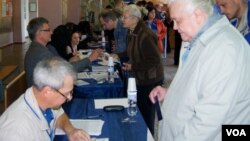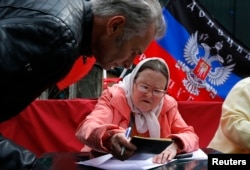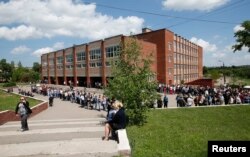DONETSK, UKRAINE —
Eastern Ukrainians began voting early Sunday in a referendum on secession, but claims quickly mounted of multiple voting.
Pro-unity activists posted a video showing how easy it was to vote more than once.
The head of the separatists’ election commission, Roman Lyagin, told VOA multiple voting was impossible because people had to queue for about a half-hour to vote - therefore no other precautions were necessary.
Additional details of the election process, provided by Lyagin, could be cause to question the integrity of the vote.
Lyagin told VOA that the separatists have been working off a 2012 electoral database, but it is incomplete and they have been adding names. He also said that anyone who turns up at a polling station and is not on the list is allowed to vote.
Ballot papers in the referendum were also printed without security provisions, voter registration was patchy and there was confusion over what the vote was for.
Analysts said the referendum does not meet international standards and is open to fraud.
What the vote means
Voters in the Donetsk and Luhansk regions, about 15 percent of the Ukrainian population, cast ballots on whether they approved of independence. But it was unclear whether that meant more autonomy within Ukraine, creation of an independent state or possibly an attempt by the Russian-speaking regions to join Russia.
Most voters said they were voting for a break from Ukraine because of the recent military campaign by Kyiv against Pro-Russian separatists. Other voters cited an expectation for a better life if their region is annexed by Russia.
In Mariupol, scene of fierce fighting last week, there were only eight polling centers for a half-million people. Queues grew to hundreds of meters long, with spirits high as one center overflowed and ballot boxes were brought onto the street, Reuters reported.
The interim government in Kyiv has denounced the referendum as illegal and a sham. Only one question is on the ballot: Should the regions form independent republics? Most residents against secession said they won't cast a vote.
But those who did file into polling stations said the recent violence in the east was reason enough to secede.
There is deep anger toward the interim government for its military campaign aimed at clearing out armed separatists from the dozens of government buildings they have seized in towns across the region.
The deaths of at least 42 people in Odessa after clashes and a fire on May 2 and about 20 in Mariupol after similar fighting this past Friday are figuring prominently in the minds of the voters.
"I voted today because I believe after what happened in Odessa and Mariupol, the unity in Ukraine is impossible and that it is better to secede," said translator Alec, 23.
Voting is due to end in the hastily arranged referendum in 53 locations at 10 p.m. local time (1900 UTC) and the rebels hope to have the ballots counted by Monday afternoon, although its outcome will not be widely recognized internationally or by Kyiv.
With several hours of polling to go, Russian news agencies were already reporting a turnout of more than 75 percent, although a separatist spokesman in Luhansk said troops had prevented the movement of ballot papers in several areas.
Kyiv's slow response
The government in Kyiv has been caught in a Catch-22 the past few weeks. By initially failing to take action against armed, Moscow-backed separatists, the government allowed the separatists to expand their reach. Then, when the central authorities later intervened, the clashes inflamed local anger.
Maria, an 81-year-old grandmother, breaks down in tears after voting in a polling station in Pushkin Boulevard in central Donetsk. She says the Kyiv government consists of bandits and they are attacking people and burning them out.
She hasn't been able to sleep. Born in the Russian city of Smolensk, she has lived in Donetsk for 60 years and says she wants a normal life for her children and grandchildren.
Much of the fear about Kyiv can be linked to the output from Kremlin-controlled media outlets, which played up the off-and-on so-called "anti-terrorist" operations launched by Kyiv. This strategy has linked the Kyiv government's attempts to regain control in the public mind with the reprisal raids mounted during the Second World War by the Nazis.
Analysts say Kyiv has not helped to dispel that impression, pursing hit-and-run tactics that deny little territory to armed and club-wielding separatists but leave local residents fearful.
And some violence has marred the voting.
On the eastern outskirts of Mariupol, a little over an hour after polls opened, soldiers from Kyiv seized what they said were falsified ballot papers, marked with "yes" votes, and detained two men. They refused to hand the men over to policemen who came to take them away, saying they did not trust them. Instead they waited for state security officers to interview and arrest them.
Around 200 kilometers north, clashes broke out around a television tower on the edge of the rebel stronghold of Slovyansk shortly before people began making their way through barricades of felled trees, tires and machinery to vote.
Election fraud possible
Voting appeared brisk, but analysts said the referendum is open to fraud. The vote, organized on an ad hoc basis with no clear controls over ballot papers or voter lists, has been widely criticized in Kyiv and in Western capitals.
No election monitors have been sent from foreign countries. And, analysts worry about the integrity of a vote being held while separatist intimidation and abductions are going on.
Most voters in Donetsk and Luhansk say they hope that if the referendum approves the regions' status as independent republics, Russia will quickly agree to annex them.
While one separatist leader said the region would form its own state bodies and military after the referendum, formalizing a split that began with the armed takeover of state buildings in a dozen eastern towns last month.
Another said the vote would not change the region's status, but simply show that the East wanted to decide its own fate, whether in Ukraine, on its own or as part of Russia.
"All military troops on our territory after the official announcement of referendum results will be considered illegal and declared occupiers,'' said Denis Pushilin, a leader of the self-styled Donetsk republic said, according to an Interfax report. "It is necessary to form state bodies and military authorities as soon as possible."
Interim Ukrainian President Oleksandr Turchynov has warned secession supporters that independence for the regions would be "a step into the abyss." He has appealed to the rebels to join talks on greater autonomy in the east.
US will not recognize results
Jen Psaki, a State Department spokeswoman, said late Saturday the U.S. will not recognize the results. She said the polls "violate international law and the territorial integrity of Ukraine."
Psaki said the U.S. is "disappointed" that Russia has not used its influence in the region to postpone the poll, despite Russian President Vladimir Putin's suggestion last week to delay the vote and his claim that Russian forces were pulling back from the Ukrainian border.
Instead, Psaki said, the U.S. does not have any indication the Russian military is moving away from the border. She said Russian state media continue to "strongly back" the referendums "with no mention of Putin's call for postponement."
Western leaders blame Moscow for encouraging the separatist movement. German Chancellor Angela Merkel and French President Francois Hollande said Saturday they would back new economic sanctions against Moscow if the ongoing unrest threatens Ukraine's May 25 presidential election.
Some modest measures may come as soon as Monday, limited by the Europe Union's reluctance to upset trade ties with Russia.
Richard Stengel, of the U.S. Department of State, will travel to Kyiv, Ukraine; Riga, Latvia; and Brussels, Belgium, beginning May 12-16.
Under Secretary Stengel will use his trip to stress the need for greater regional engagement to support Ukraine’s upcoming May 25 elections, push back against efforts to delegitimize them and ensure that all Ukrainians are given the chance to decide their future for themselves.
Additional information was provided by AFP, Reuters, AP.
Pro-unity activists posted a video showing how easy it was to vote more than once.
The head of the separatists’ election commission, Roman Lyagin, told VOA multiple voting was impossible because people had to queue for about a half-hour to vote - therefore no other precautions were necessary.
Additional details of the election process, provided by Lyagin, could be cause to question the integrity of the vote.
Lyagin told VOA that the separatists have been working off a 2012 electoral database, but it is incomplete and they have been adding names. He also said that anyone who turns up at a polling station and is not on the list is allowed to vote.
Ballot papers in the referendum were also printed without security provisions, voter registration was patchy and there was confusion over what the vote was for.
Analysts said the referendum does not meet international standards and is open to fraud.
What the vote means
Voters in the Donetsk and Luhansk regions, about 15 percent of the Ukrainian population, cast ballots on whether they approved of independence. But it was unclear whether that meant more autonomy within Ukraine, creation of an independent state or possibly an attempt by the Russian-speaking regions to join Russia.
Most voters said they were voting for a break from Ukraine because of the recent military campaign by Kyiv against Pro-Russian separatists. Other voters cited an expectation for a better life if their region is annexed by Russia.
In Mariupol, scene of fierce fighting last week, there were only eight polling centers for a half-million people. Queues grew to hundreds of meters long, with spirits high as one center overflowed and ballot boxes were brought onto the street, Reuters reported.
The interim government in Kyiv has denounced the referendum as illegal and a sham. Only one question is on the ballot: Should the regions form independent republics? Most residents against secession said they won't cast a vote.
But those who did file into polling stations said the recent violence in the east was reason enough to secede.
There is deep anger toward the interim government for its military campaign aimed at clearing out armed separatists from the dozens of government buildings they have seized in towns across the region.
The deaths of at least 42 people in Odessa after clashes and a fire on May 2 and about 20 in Mariupol after similar fighting this past Friday are figuring prominently in the minds of the voters.
"I voted today because I believe after what happened in Odessa and Mariupol, the unity in Ukraine is impossible and that it is better to secede," said translator Alec, 23.
Voting is due to end in the hastily arranged referendum in 53 locations at 10 p.m. local time (1900 UTC) and the rebels hope to have the ballots counted by Monday afternoon, although its outcome will not be widely recognized internationally or by Kyiv.
With several hours of polling to go, Russian news agencies were already reporting a turnout of more than 75 percent, although a separatist spokesman in Luhansk said troops had prevented the movement of ballot papers in several areas.
Kyiv's slow response
The government in Kyiv has been caught in a Catch-22 the past few weeks. By initially failing to take action against armed, Moscow-backed separatists, the government allowed the separatists to expand their reach. Then, when the central authorities later intervened, the clashes inflamed local anger.
Maria, an 81-year-old grandmother, breaks down in tears after voting in a polling station in Pushkin Boulevard in central Donetsk. She says the Kyiv government consists of bandits and they are attacking people and burning them out.
She hasn't been able to sleep. Born in the Russian city of Smolensk, she has lived in Donetsk for 60 years and says she wants a normal life for her children and grandchildren.
Much of the fear about Kyiv can be linked to the output from Kremlin-controlled media outlets, which played up the off-and-on so-called "anti-terrorist" operations launched by Kyiv. This strategy has linked the Kyiv government's attempts to regain control in the public mind with the reprisal raids mounted during the Second World War by the Nazis.
Analysts say Kyiv has not helped to dispel that impression, pursing hit-and-run tactics that deny little territory to armed and club-wielding separatists but leave local residents fearful.
And some violence has marred the voting.
On the eastern outskirts of Mariupol, a little over an hour after polls opened, soldiers from Kyiv seized what they said were falsified ballot papers, marked with "yes" votes, and detained two men. They refused to hand the men over to policemen who came to take them away, saying they did not trust them. Instead they waited for state security officers to interview and arrest them.
Around 200 kilometers north, clashes broke out around a television tower on the edge of the rebel stronghold of Slovyansk shortly before people began making their way through barricades of felled trees, tires and machinery to vote.
Election fraud possible
Voting appeared brisk, but analysts said the referendum is open to fraud. The vote, organized on an ad hoc basis with no clear controls over ballot papers or voter lists, has been widely criticized in Kyiv and in Western capitals.
No election monitors have been sent from foreign countries. And, analysts worry about the integrity of a vote being held while separatist intimidation and abductions are going on.
Most voters in Donetsk and Luhansk say they hope that if the referendum approves the regions' status as independent republics, Russia will quickly agree to annex them.
While one separatist leader said the region would form its own state bodies and military after the referendum, formalizing a split that began with the armed takeover of state buildings in a dozen eastern towns last month.
Another said the vote would not change the region's status, but simply show that the East wanted to decide its own fate, whether in Ukraine, on its own or as part of Russia.
"All military troops on our territory after the official announcement of referendum results will be considered illegal and declared occupiers,'' said Denis Pushilin, a leader of the self-styled Donetsk republic said, according to an Interfax report. "It is necessary to form state bodies and military authorities as soon as possible."
Interim Ukrainian President Oleksandr Turchynov has warned secession supporters that independence for the regions would be "a step into the abyss." He has appealed to the rebels to join talks on greater autonomy in the east.
US will not recognize results
Jen Psaki, a State Department spokeswoman, said late Saturday the U.S. will not recognize the results. She said the polls "violate international law and the territorial integrity of Ukraine."
Psaki said the U.S. is "disappointed" that Russia has not used its influence in the region to postpone the poll, despite Russian President Vladimir Putin's suggestion last week to delay the vote and his claim that Russian forces were pulling back from the Ukrainian border.
Instead, Psaki said, the U.S. does not have any indication the Russian military is moving away from the border. She said Russian state media continue to "strongly back" the referendums "with no mention of Putin's call for postponement."
Western leaders blame Moscow for encouraging the separatist movement. German Chancellor Angela Merkel and French President Francois Hollande said Saturday they would back new economic sanctions against Moscow if the ongoing unrest threatens Ukraine's May 25 presidential election.
Some modest measures may come as soon as Monday, limited by the Europe Union's reluctance to upset trade ties with Russia.
Richard Stengel, of the U.S. Department of State, will travel to Kyiv, Ukraine; Riga, Latvia; and Brussels, Belgium, beginning May 12-16.
Under Secretary Stengel will use his trip to stress the need for greater regional engagement to support Ukraine’s upcoming May 25 elections, push back against efforts to delegitimize them and ensure that all Ukrainians are given the chance to decide their future for themselves.
Additional information was provided by AFP, Reuters, AP.













